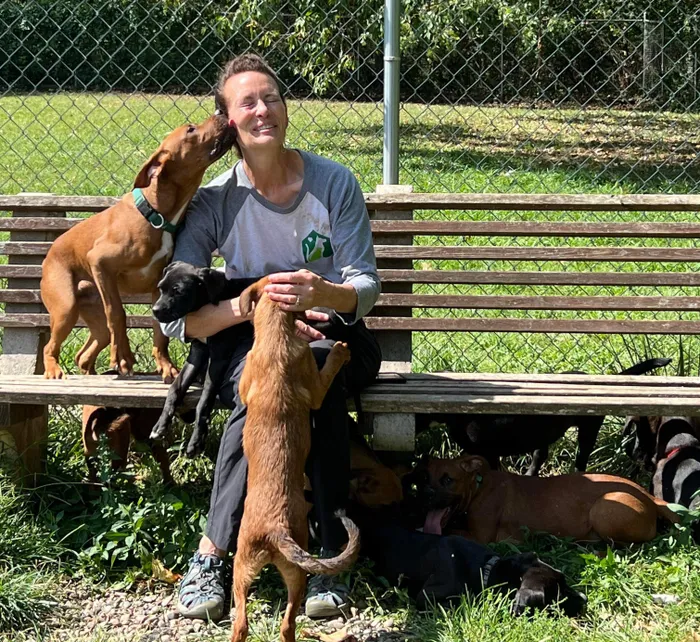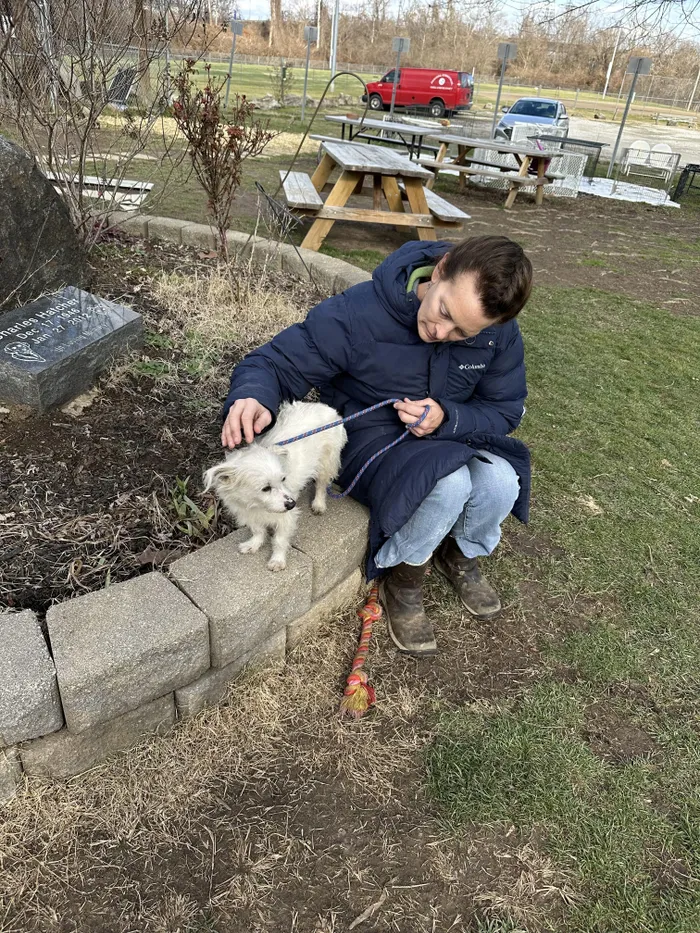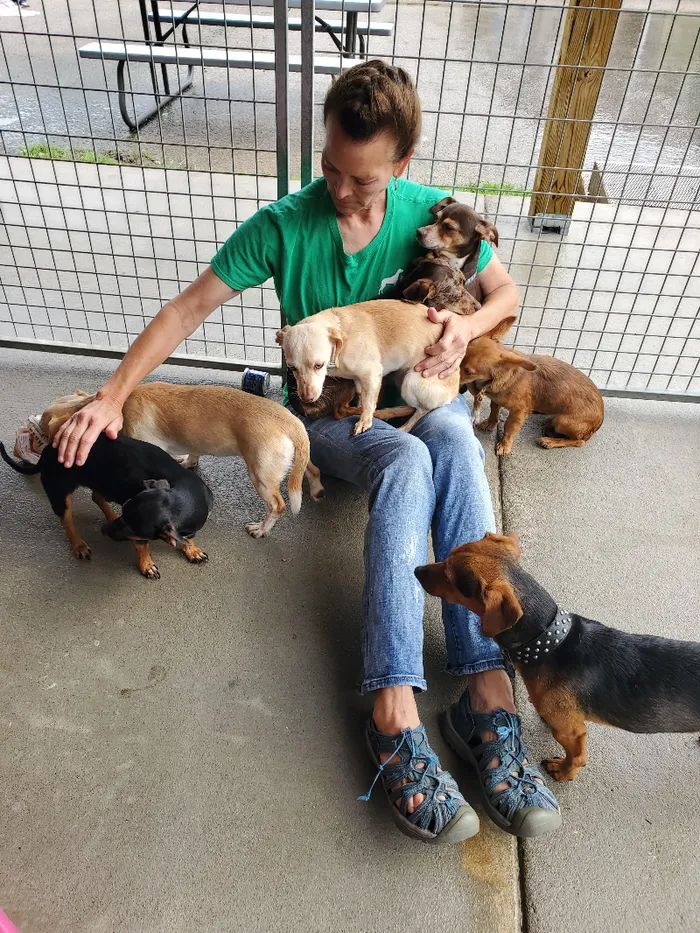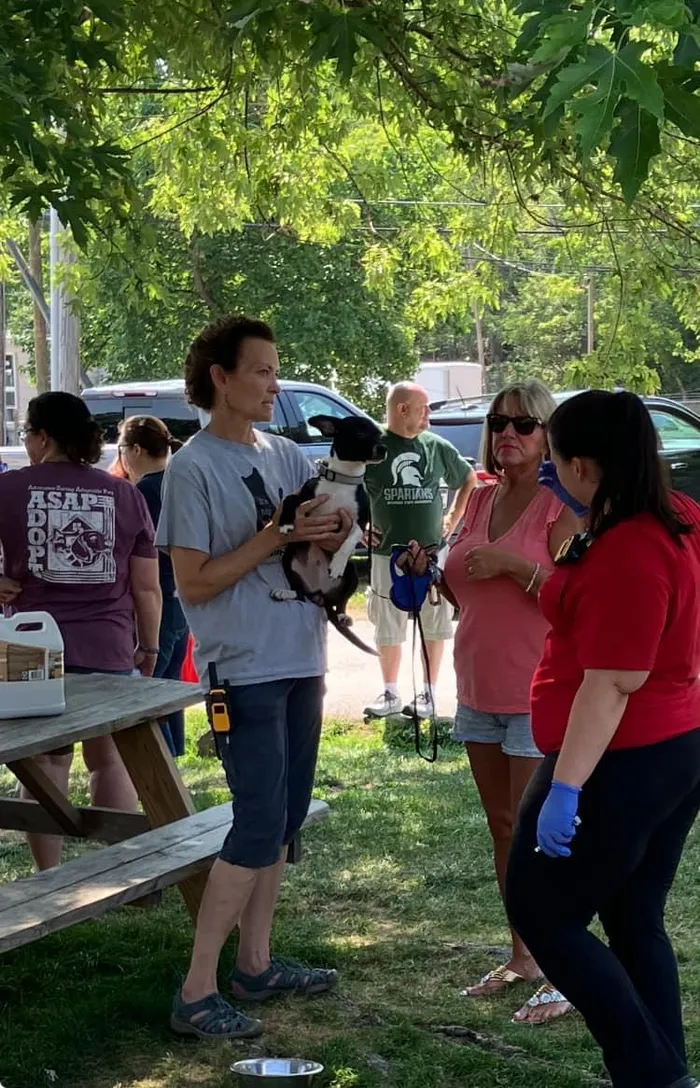Courtney Proctor Cross: transforming Huntington's animal shelter from a death sentence to a beacon of hope

Courtney Proctor Cross, director of the Huntington Cabell Wayne Animal Control Shelter in Huntington, West Virginia, with several shelter dogs.
Image: Huntington Cabell Wayne Animal Control Shelter/The Washington Post
The first day Courtney Proctor Cross walked into Huntington, West Virginia’s municipal animal shelter as its new director, she saw a dog in a crate barking frantically, standing up to his ankles in urine.
Dogs and cats were crammed into overcrowded wire crates, many with no water in the late-summer heat. Some of the cats had already died; others were barely hanging on.
“It was a nightmare,” Proctor Cross said of that day in 2018. “We had no idea we were going to find this horrific scene, but that’s what it was.”

Little Buddy, the dog who was found with urine in his crate. He went on to be adopted by a loving family.
Image: Heather Aulick/The Washington Post
She helped ensure that barking dog got adopted - and thousands of others.
Before Proctor Cross arrived, the shelter was euthanizing between 50 to 75 percent of the animals that came in, she said, many of them healthy and adoptable, because they didn’t have the funding or space to care for them.

Proctor Cross on a walk with a shelter dog, trying to build trust.
Image: Huntington Cabell Wayne Animal Control Shelter/The Washington Post
In Huntington, a city where more than 27 percent of the population lives below the poverty line, public services have long been financially strained, including for animals.
“I couldn’t even stand to drive by the shelter,” said Proctor Cross, who had been an elementary schoolteacher for 30 years. “Just looking at their little faces and knowing what was going to happen to most of them, it was really painful to think about.”

Proctor Cross with some puppies at the shelter.
Image: Huntington Cabell Wayne Animal Control Shelter/The Washington Post
Before becoming the executive director of the Huntington Cabell Wayne Animal Control Shelter, Proctor Cross volunteered with One by One Animal Advocates, a local rescue group that often clashed with the shelter’s leadership.
“They would put a lot of restrictions on us,” said Heather Aulick, president of the rescue group. “There were times they said our rescue couldn’t pull any animals at all. They wanted to keep it all under wraps because most people didn’t realize how bad it was.”
Volunteers walked dogs at the shelter, only to return later and find the animals euthanized, Aulick said.
“You would walk a happy, wonderful dog one day and go back the next and they would have killed him for no reason,” Aulick said. “That was just how they operated.”
Proctor Cross - who has seven dogs of her own - decided to apply to run the shelter.

Proctor Cross at an adoption event in 2024.
Image: Huntington Cabell Wayne Animal Control Shelter/The Washington Post
Steve Williams, the mayor of Huntington at the time, had been seeking new leadership when Proctor Cross put her name forward. He welcomed the idea.
“We were scraping every penny that we could to be able to get it into the shelter,” Williams said. “What we were seeing at the shelter was just pitiful.”
He thought new leadership - specifically, Proctor Cross - might help the situation. While a lack of funding was one issue, Williams said, the community wanted a different approach to shelter overcrowding. Rather than automatically euthanizing, they wanted the shelter to work with people who had fallen on hard times and did not have the resources to care for their pets.
“The people who were running it really didn’t have the heart for it,” he said. “They thought nothing about euthanizing these animals.”
Proctor Cross was named director of the shelter in August 2018. She inherited not just financial woes and overcrowding, but also an aging building infested with mice and roaches, with poor ventilation and few windows.
“The first several years, we were slogging through every day,” Proctor Cross said. “There were so many things wrong financially, in addition to the condition of the building and how the animals had been cared for. Getting all of that turned around was very much like trying to paddle upstream.”
To bring change, Proctor Cross pushed for more government funding, secured corporate sponsorships and grants and created the Western West Virginia Animal Alliance, a nonprofit that supports the shelter. She used social media to promote adoptable pets and partnered with local rescues, including One by One Animal Advocates and Advocates Saving Adoptable Pets. She also transformed an abandoned school building across the street into a second shelter space, which includes a surgical unit funded by a foundation in Boston. Her husband stepped in to help manage the shelter’s finances, and volunteers and animal advocates rallied around her leadership.
There are usually between 350 to 400 animals in the shelter at a time, and the shelter generally takes in about 3,000 pets a year. It returns some to their owners, adopts out about a third of them, and sends the rest to rescues, Proctor Cross said. Less than three percent are euthanized, and only in cases where they are severely ill or overly aggressive, she said.
“We’re doing everything in our power to keep from doing that,” Proctor Cross said.
Under Proctor Cross’s leadership, the shelter is now designated as “no-kill,” meaning a 90 percent placement rate for animals.
“It’s been a collective effort from me, the community and the rescue groups,” Proctor Cross said. “We have a lot of support from people who really care.”
Shelter staff credit Proctor Cross with leading the change. They say she’s known for answering her phone at all hours of the day and night.
“She will never tell people how much she gives and how much she does with so little,” said Lee Domaszowec, a chief strategist at a nonprofit consulting company, who helped Proctor Cross develop fundraising and volunteer strategies.
“She really has built a great team that has grossly exceeded expectations,” Domaszowec said. “If there were more people like her, even one in every community, our country would be a much better place.”
Lisa Krasnow, who worked in the shelter office from 2018 to 2022 and is now a volunteer, said the transformation is remarkable.
“The old shelter, when you would walk in and surrender a dog, it was pretty much a death sentence,” Krasnow said.
But with Proctor Cross at the helm, she said, everything is different.
“Courtney has a vision, and she has a dream,” Krasnow said. “She just doesn’t quit. She goes above and beyond.”
Proctor Cross - who reinvests most of her salary into the shelter - regularly drives employees without transportation to and from work, Krasnow said, and accompanies them to doctors’ appointments and court hearings when they ask.
Proctor Cross said her dedication to the shelter is a way to honor her parents, both animal lovers who died in the 1970 crash of Southern Airways Flight 932, which killed 75 people, including 37 members of the nearby Marshall University football team. Proctor Cross was 6 years old.
“Everybody was crying and family members started coming,” said Proctor Cross, adding that her father was a doctor for the team. “That’s one of those lightning bolt events in life; it’s before and after.”
She struggled to grasp the enormousness of the loss.
“I remember going to their funeral. There were closed caskets,” Proctor Cross said between tears. “I thought if they could just disappear, maybe they could also reappear.”
Proctor Cross grew up in Huntington, surrounded by animals: dogs, cats, rabbits, guinea pigs and fish. After her parents died, she moved in with her aunt and uncle in Fayetteville, West Virginia, and she and her siblings brought a dog and a cat with them.
She moved back to Huntington after high school to attend Marshall University.
“I always felt this connection to Huntington, and it made me feel closer to my parents,” she said. “I think that the plane crash has impacted pretty much every facet of my life.”
Last spring, Proctor Cross was featured on the cover of the local magazine, Huntington Quarterly.
“She is not just a local hero, she is a national example,” Williams, the former mayor, said. “Her heart is bigger than the tallest mountains in West Virginia.”
Proctor Cross said her work is far from done.
“There are so many more animals that need help,” she said. “We’ve achieved so much, but I know there’s probably that much more to do.”
Related Topics: